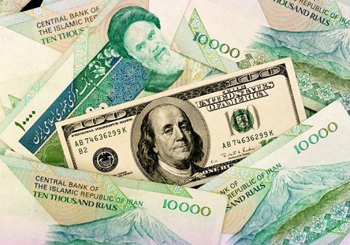
With global oil prices above $100 a barrel, the world’s fifth biggest oil exporter Iran says it can cope with the imposed international trade and financial restrictions, but analysts were less sure.
“The central bank is struggling to maintain the value of the rial but the nuclear dispute, the government’s economic policies and fear of a strike makes it almost impossible,” said analyst Hamid Farahvashian.
On Tuesday the exchange rate for dollar was 15,300 rials at the free market, from around 13,400 rials to the dollar last week. The rial has lost over 50 percent value against the dollar in the past few months.
International sanctions imposed on Iran since 2006, particularly those which made it difficult to transfer cash in and out of Iran, have had a negative impact on the value of the currency and made it difficult for Iranian banks to do business with western banks.
“Iran is facing serious economic hardship and the situation will worsen because of the increasing tension between the West and Iran over its nuclear activities,” said Farahvashian.
The threat of military strikes has also upturned the quiet and comfortable lives once enjoyed by many Iranians, ushering in a new era of struggle and fear.
The United States and Israel have not ruled out military action against Iran’s nuclear facilities if diplomacy fails to resolve a dispute over a programme they suspect is aimed at developing atomic weapons.
President Mahmoud Ahmadinejad said his government was determined to control the foreign exchange market, blaming Iran’s enemies for undermining the currency.
The sanctions have kept away an increasing number of international companies, particularly western firms, from doing business in Iran.
A report in Iranian media on Iran temporarily stopping trade with the United Arab Emirates over its support of the international sanctions had a negative impact on the value of the rial. The report was later denied by the authorities.
The sanctions have prompted Iranians to withdraw their savings and rush to buy dollars and gold as a safeguard against inflation — creating heavy pressure for the rial currency to depreciate.
Another report in the Iranian media about cuts to the interest rates of banks, which was denied by the Money and Credit Council, also created fear among many Iranians who have withdrawntheir bank savings and changed them into dollar since April.
Frustration is simmering among lower and middle-class Iranians. Prices of most consumer goods have risen and many Iranians struggle to make ends meet.
“With this economic situation, I prefer to keep my savings at home and in hard currency,” said housewife Maryam Jafari, 37.
Critics blame Ahmadinejad for squandering petrodollars and fuelling inflation. But Ahmadinejad has shown no hint of revising his unorthodox economic policies and says that the country has enough foreign exchange reserves.
Oil earnings still account for up to 60 percent of state income and a surge in consumer imports under Ahmadinejad and fuel and food subsidy cuts since 2010 have hit local industries and forced some plants to close.
A member of Tehran’s Chamber of Commerce said the rial will further lose value in the coming days.
“Iran’s foreign exchange system is suffering from weak management (failing) to curb the exchange rate,” said Asadollah Asgaroladi, the Jomhuri-ye Eslami daily reported.
Revelation of a $2.6 billion embezzlement case in October also caused distrust among ordinary Iranians.
Some hardline politicians linked the main suspect in the fraud to a so-called “deviant current”, allegedly led by Ahmadinejad’s chief of staff and closest ally Esfandiar Rahim Mashaie.
He is accused by many Shi’ite clerics and politicians of trying to undermine the central role of the clergy in politics by emphasising the nationalist strain of Iranian history and culture.
Some MPs said the government was linked to the scam in order to fund monthly compensation of $40 per person introduced since eliminating fuel and energy subsidies.
“People do not trust the Central Bank’s monetary policies,” said economist Abolqasem Hakimipour, the semi official Fars news agency reported.
“The continued increase of the foreign exchange rate will lead to inflation rate to be over 27 percent and preventing this requires the Central Bank’s swift action.” (Reporting By Mitra Amiri)